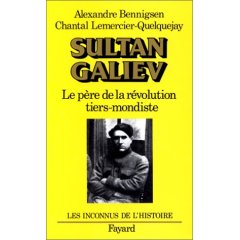
|

|

|

|

|

|

MIM opens this web page to start a process of re-appraisal of Mirza Sultan-Galiev, a Tatar communist who worked for Stalin on the nationalities question, but who rumor says Stalin eventually shot 1939 or 1940.
MIM does not doubt that what Stalin said about Sultan-Galiev's violations of democratic centralism is true. We should investigate on this page to what extent those violations of democratic centralism were on account of being an intellectual unable to follow democratic centralism and to what extent all the ideas concerned were too new. MIM has too much experience organizing a movement to doubt that people often have strange ideas about democratic centralism, especially when much action occurs in a short space of time.
Nonetheless, more important than Sultan-Galiev's success or failure in organizational matters is his theoretical legacy. This web page was ironically inspired by pseudo-feminist Amerikkkan nationalist Phyllis Chesler, who asks the world to support "Muslim dissidents." This made MIM think of Sultan-Galiev, for his project was to set up a Pan-Islamic communist movement.
Sultan-Galiev was for the formation of a "Colonial International" to replace the Comintern as organization of central importance. He also called for the "dictatorship of the colonial nations over the metropolis."
The reason we have to re-evaluate Sultan-Galiev is that his most central theoretical predictions appear to have turned out true:
On both a theoretical and factual level, the central question is which is the greater danger to the international communist movement, the national bourgeoisie of the neo-colonial countries or the labor aristocracy. MIM has answered this question in factual detail. It is the Western labor aristocracy which in fact predominates in the global bourgeoisie.
MIM is for the "joint dictatorship of the proletariat of the oppressed nations." Missing from Sultan-Galiev's formulations is the word "proletariat." On the other hand, Lenin and Stalin were for the "dictatorship of the proletariat." Missing is the term "oppressed nations," except as allies.
We should be absolutely clear that when Lenin and Stalin said "dictatorship of the proletariat" allied with the oppressed nations, they meant the European industrial proletariat. Having brought the Russian proletariat to revolutionary activity, we can say that Lenin and Stalin earned their theoretical formulation. However, the last 89 years since 1917 have shown that the faith in the Western industrial proletariat, especially the French and British proletariats as targetted by Sultan-Galiev, was not earned in the material world. It must be consigned to the dustbin of metaphysics.
When Stalin said Sultan-Galiev "sapped" the will of the oppressed nations to work with the European industrial proletariat, he was right. Nonetheless, the history that followed cannot be boiled down to a violation of democratic centralism. Either Stalin was more correct or Sultan-Galiev was more correct about the future.
Sultan-Galiev came up with the phrase "proletarian peoples" to refer to oppressed nations. It was the flipside of the thesis adopted by Lenin in "Imperialism," that entire countries could be parasites. Again the danger is that Sultan-Galiev whitewashed the reactionary classes of the colonial countries. It is only retrospectively that we can evaluate--which was the greater danger, the labor aristocracy or the colonial exploiting classes?
The Bolsheviks undertook a dizzying series of moves from 1917 to 1923. When we track down Phyllis Chesler's concerns about the condition of wimmin under Islam we often end up right in the circles of Sultan-Galiev. The first Muslim wimmin pioneers for equality trace back to the Bolshevik-inspired movements.
In quick succession, the Bolsheviks supervised the formation of a Muslim communist party specifically separate from the Russian one. Then it abolished that party and merged it into the Russian Party. The decisions came quickly based on the demands of war. At the crucial juncture in 1923, Stalin chose to give Karabakh to Azerbaijan to appease Turkey. Sultan-Galiev had successfully called for the formation of a Crimean autonomous region for Tatars, but his call for Pan-Turkic or Pan-Islamic nationalism as an alternative way of handling Turkey fell by the wayside. Now the great historical question is: were Lenin and Stalin right? Did they orient themselves to the East enough? The underlying question is really, what was the greater danger, the labor aristocracy or the exploiter classes of the colonial nations?
It's interesting that M.N. Roy of India backed Sultan-Galiev for the most part theoretically, but opposed some of Sultan-Galiev's projects, calling one of them "Zinoviev's circus." Zinoviev we will recall was the one appointed by Lenin to keep the German communists from representing the labor aristocracy. Lenin and Zinoviev both referred to Germany as a majority petty-bourgeois. (See our "On the historical role of G. Zinoviev."
One last point we will raise is Lenin's own Tatar background. He was from a similar place as Sultan-Galiev. Can we give any credence to the term "Tatar imperialism"? Did Lenin make a mistake and forget his own formulation of what imperialism is? Was there a Tatar financial banking elite manipulating Sultan-Galiev when Lenin turned down the idea of a joint republic with Bashkirs?
MIM has already pointed out that Lenin's formulation of the republics of the Soviet Union prevented some of the colonial settler type wars that plagued France. At the same time, there were settler type activities going on throughout the Soviet Union. When the Soviet Union fell apart relatively peacefully in some ways Lenin was vindicated again, but should he have pushed for internationalism of the smaller oppressed nations joined together in a larger republic? Is the division of Uzbekistan, Tajikistan etc. really in the interests of those peoples or did those divisions end up serving Russian imperialism? Could the oppressed nations have managed a joint effort without killing themselves internally?
Here we invite contributions on the subject. We hope to update this page as we discuss the relevant topics. Whether or not Stalin was right in 1923, we can say for sure that Sultan-Galiev's ideas deserve more respect today.